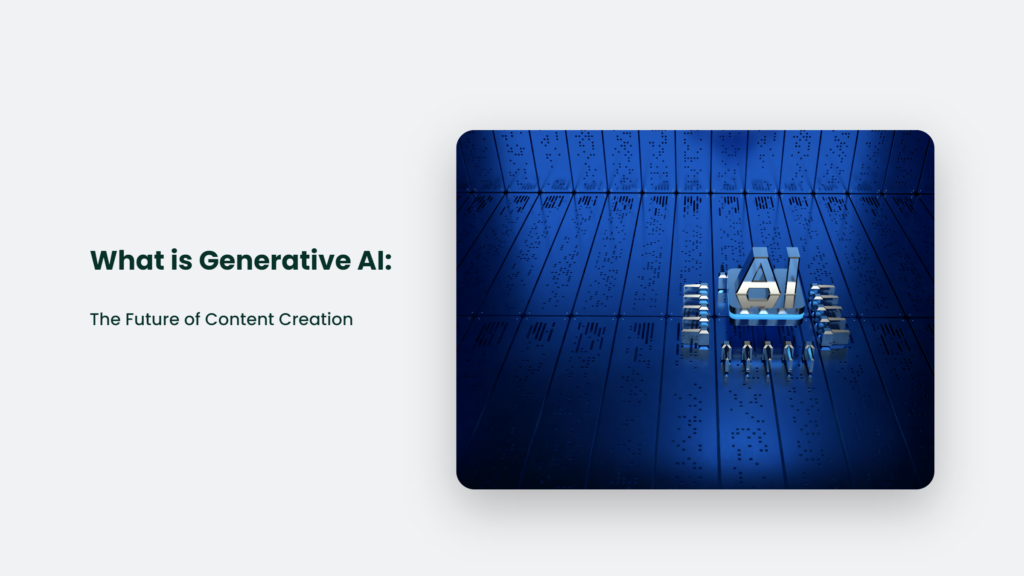What if I told you that the future of content creation lies in the hands of artificial intelligence? Generative AI, a type of artificial intelligence that can produce content such as audio, text, code, video, images, and other data, is revolutionising the way we create and consume content.
In this article, we’ll dive into the world of generative AI, explore its potential applications, and ponder What is Generative Ai?

What is Generative AI?
Generative AI is a form of machine learning that enables computers to generate new and exciting content based on a training data set. These AI systems, such as ChatGPT, Bard, DALL-E, and DeepMind, can produce outputs in the same medium in which they are prompted (e.g., text-to-text) or in a different medium from the given prompt (e.g., text-to-image or image-to-video).
But why should you care about generative AI? As Alan Perlis once said, “A year spent in artificial intelligence is enough to make one believe in God”. The potential applications of generative AI are vast and varied, spanning industries such as art, writing, software development, healthcare, finance, gaming, marketing, and fashion.
The Power of Generative AI: Examples and Applications
Let’s take a look at some examples of how generative AI is transforming various industries:
Entertainment:
Generative models are used to create new music, art, and even TV shows and movies. For instance, generative AI has been used to create a new album by the virtual band Yona, which AI entirely generated. In the film industry, AI-generated scripts have been used to create short films like “Sunspring,” written by an AI named Benjamin.
Gaming:
Generative models can create new game content, such as levels and characters, that adapt to the player’s preferences. For example, AI Dungeon, a text-based adventure game, uses generative AI to create unique storylines and scenarios based on the player’s choices.
Finance:
Generative models are being used to develop new trading strategies and investment models, analysing vast amounts of data to make informed decisions. Hedge funds like Numerai and Aidyia use generative AI to create and refine their trading algorithms.
Healthcare:
Pharmaceutical companies like Amgen and Insilico Medicine use generative AI to shorten product development and improve drug discovery. By analysing vast amounts of chemical and biological data, generative AI can help identify potential drug candidates more quickly and accurately than traditional methods.
These are just a few examples of how generative AI revolutionises various industries. The global generative AI market is worth over $13 billion and is expected to surpass $22 billion by 2025, growing at a CAGR of 27.02%.
Generative AI and Intellectual Property
As generative AI becomes more prevalent, questions surrounding intellectual property rights and ownership of AI-generated content arise. Who owns the copyright to a piece of music, art, or literature created by an AI system? Should the AI developer, the user who prompted the AI, or the AI itself be considered the author?
These questions are still being debated, and as generative AI continues to evolve, legal frameworks and regulations will need to adapt to address these issues.
Generative AI in Education
Generative AI has the potential to revolutionise education by providing personalised learning experiences for students. AI-powered educational tools can generate customised content, such as lessons, quizzes, and feedback, tailored to each student’s needs and learning style.
This personalised approach can help students learn more effectively and efficiently, ultimately improving educational outcomes.
Frequently Asked Questions:
What are the limitations of Generative AI?
– Quality and coherence: Generated content may not always be of high quality or coherent, especially when dealing with complex or ambiguous inputs.
– Bias: Generative AI models can inherit biases from the training data, which may lead to biased outputs.
– Ethical concerns: The potential for generating deepfakes, misinformation, and harmful content raises ethical concerns.
– Intellectual property and rights: Determining the ownership and rights of content generated by AI can be challenging.
The Bottom Line:
Generative AI is undoubtedly a game-changer in the world of content creation. Its potential applications are vast and varied, and its impact on industries such as entertainment, gaming, finance, and healthcare is undeniable. However, as we continue to explore the possibilities of generative AI, it’s crucial to address its ethical concerns and ensure that this powerful technology is developed and used responsibly. After all, as the saying goes, “With great power comes great responsibility.”




